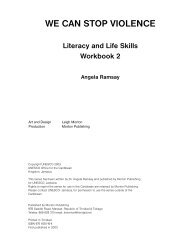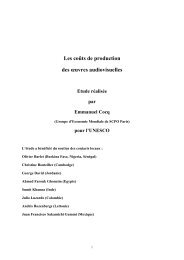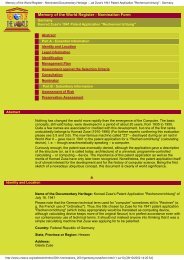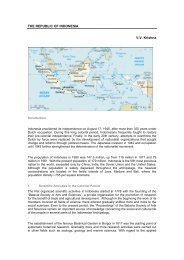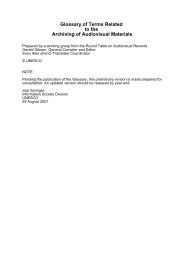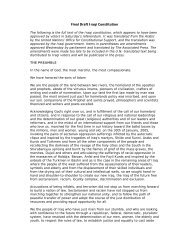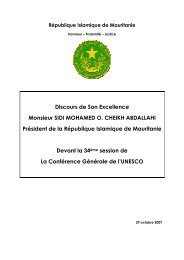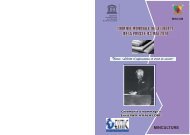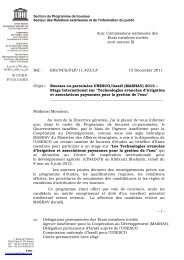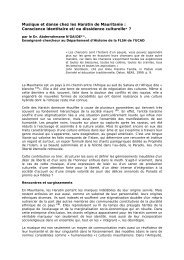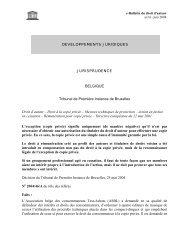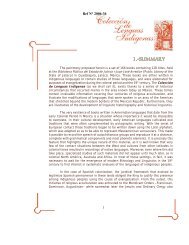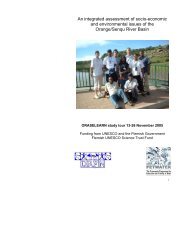Accepted Papers - 3.pdf - UNESCO
Accepted Papers - 3.pdf - UNESCO
Accepted Papers - 3.pdf - UNESCO
You also want an ePaper? Increase the reach of your titles
YUMPU automatically turns print PDFs into web optimized ePapers that Google loves.
National Seminar on Rainwater Harvesting and Water Management 11-12 Nov. 2006, Nagpur<br />
66. New Drinking Water Resources with Fiber Plastic Bed Rainwater<br />
Harvesting Plants to Solve Water Scarcity Problem<br />
INTRODUCTION<br />
Not only for human beings but for all living<br />
beings the basic requirements are food, shelter and<br />
clothing. A nation, that satisfies all these basic needs,<br />
is a developed nation. But many countries are not<br />
able to develop due to the scarcity of water and the<br />
problems of flood.<br />
Today, the water received through rain is stored<br />
in dams, ponds, wells, lakes, rivers and also in the<br />
form of underground water table. Water satisfies<br />
all the needs such as agricultural, industrial and<br />
drinking. But because of the red, brown, or milky<br />
color of water in ponds and lakes, it is unfit for<br />
drinking. Even though the ground water is colorless,<br />
it may be tasty, tasteless or salty. Only in very few<br />
places the groundwater is fit for drinking purpose.<br />
Day by day, depletion of water level occurs because<br />
huge quantity of water is sucked forth from<br />
underground water table.<br />
Besides lakes, wells, ponds and underground<br />
water, water from dams are also used by a large<br />
number of people for the purpose of drinking,<br />
*Veerappan. J<br />
Abstract<br />
Today tremendous development has taken place in different disciplines such as<br />
medicine, arts, literature, science, electricity, transport, computers and<br />
telecommunications etc. But one of the major unsolved problems in many countries is<br />
‘the water scarcity and flooding problem’. At this juncture, a Project is developed to<br />
give solution to this water scarcity problem. In this project, each fiber plastic bed<br />
plant can be extended to any extent and any type of land as required. So, through<br />
these plants sufficient drinking water can be derived in small villages, big towns and<br />
cities. This paper reports the constructed model of a Rainwater Collection Plant of<br />
this project and its performance. This paper also reports multipurpose applications of<br />
this project such as drinking, irrigation, as well as for benefit of animals. Finally, this<br />
paper sums up that all living beings essentially require water for sustenance and to a<br />
great extent this project would help in harnessing the enormous amount of rainwater<br />
and thereby ensuring good storage of surface water and ground water perennially.<br />
agricultural and industrial purposes. But these dams<br />
do not have enough water to be supplied to the<br />
regions which are far away from the dams. Also the<br />
population near the dam area has increased rapidly<br />
due to migration of people from water scarce regions.<br />
Hence people belonging to dam region are not able<br />
to meet their annual water requirements. A famous<br />
Tamil Idiom says ‘Give only when you have excess’.<br />
Thus people of dam region cannot supply water to<br />
dry region even though they are very closer to them,<br />
as they themselves do not have enough water. This<br />
may be one of the reasons that the National River<br />
Interlinking Project is delayed.<br />
These water crises are partly solved in villages<br />
of very low population with the help of Government<br />
subsidiary funds through various beneficial projects.<br />
(In India, ‘Swajaladhara’, ‘Rajiv Gandhi Drinking<br />
Water Mission’, ‘Power pump scheme’, etc.) [1].<br />
But the towns and big cities suffer due to severe<br />
water shortage, as they are located far away from<br />
the dams. In these places, water is not available<br />
even for drinking, then how hospitals, agricultural<br />
*Asst.Professor, Dept. of Electronics and Communication Engineering, K.L.N College of Engineering<br />
(Affiliated to Anna University, Chennai), Pottapalayam, Tamil Nadu State- 630611, INDIA.<br />
Phone No. 0452-2698971, Fax: 0452-2698280, E.mail:veerappanna@yahoo.co.in<br />
382



